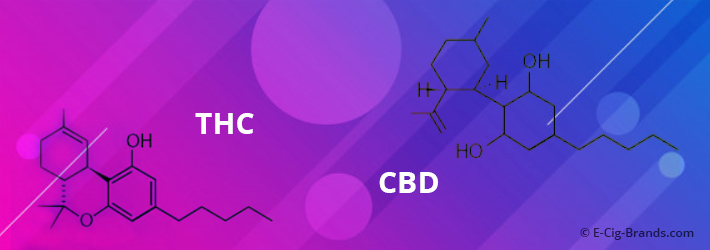
Are you interested in using CBD products? If so, you’re probably curious about its benefits as well as its relation to another substance closely associated with it, THC. So, are CBD and THC the same? Can you have CBD without THC?
Terms like CBD and THC have become so incredibly popular that, because they are both relevant to the discussion of cannabis and its health benefits, are often confused. To answer the question: What is THC in CBD?, is simple; THC is not contained in CBD. While the two compounds do share a relationship and similar point of origin, they are markedly different and even their molecular makeup is different. The following article is going to look at both of these compounds and their differences.
CBD & THC: The Differences
The cannabis plant is the origin of more than 80 different cannabinoids, the most known among them are Tetrahydrocannabinol (THC) and Cannabidiol (CBD). Cannabinoids are compounds that interact with the body’s Endocannabinoid System (ECS), which consists of a network of receptors, enabling the body to utilize the benefits of compounds such as CBD and THC. The main receptors are referred to as CB1 and CB2 receptors. CB1 receptors are found in heavy concentrations in areas of the brain that are responsible for mental and physiological functions like emotion, memory, high cognition, and motor coordination. CB2 receptors are located in the immune and central nervous systems. It is the interaction between these receptors that cannabinoids, such as THC and CBD are utilized so well within the body for such health benefits as pain relief, mood management, and anxiety relief (among so many others).
How THC and CBD Work in the Body?
While both offer benefits to the body, CBD and THC are inherently different compounds and the body’s CB1 and CB2 receptors react to both differently. THC binds directly with the CB1 receptors and it creates signals that get sent to the brain and this includes the mind-bending, psychoactive aspect associated with it. CBD, on the other hand, does not create and bond with the CB1 receptor, and when consumed, it may even have the effect of neutralizing the psychoactive aspects of THC. THC does present a range of health benefits, but due to its mind-altering effects, many people would prefer to steer clear. CBD, though, offers many of the same benefits as THC, without the “high.”
Is THC Legal?
THC stands as an entirely separate substance from CBD and currently, THC, which originates as a cannabinoid derived from the marijuana plant, is classified as illegal in many places in the world, including the majority of the US. CBD, despite its relation to THC, falls into a neutral territory, and under the US Farm Bill of 2014, hemp-derived CBD remains legal federally.
As of the present time in 2026, in the US there are just 10 states where Cannabis, (this includes both marijuana and hemp), are 100% legal for recreational and medicinal use: Alaska, California, Colorado, Maine, Massachusetts, Michigan, Nevada, Oregon, Vermont, and Washington.
CBD & THC: In Conclusion
CBD and THC, though they share many similarities, they maintain clear differences, as they are both cannabinoids. There is no THC in CBD, as they both originate from the same source, and while they are related as compounds found in cannabis, they work differently in the body. This isn’t to say one is better than the other, but they are inherently different and there are many people out there who wish to use CBD for its many benefits without the psychoactive properties associated with THC. So, if you’re interested in taking advantage of the many benefits of CBD, it’s important to know that THC is not necessarily included.
